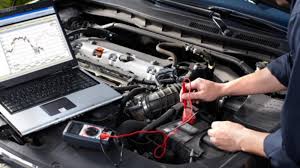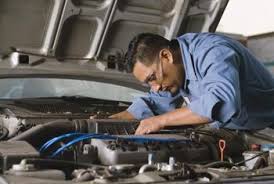What Kind of Equipment Does an Auto Mechanic Use?
The job of an auto mechanic has become increasingly specialized in the 21st century. Until the 1960s, all you needed was a good wrench set, a strong pair of pliers and a couple of sizes of screwdrivers and you could repair most cars. Modern cars are much more evolved, with hundreds of computer chips and solid state electronic parts. It requires specialized equipment to diagnose problems with these sophisticated electronic devices, and auto mechanics today have to learn how to use modern electronic diagnostic equipment as well as all of the traditional tools of the trade.
Hand Tools
Hand tools are still an essential part of an auto mechanic’s tool set. All commercial garages have pneumatic wrenches to make life easier, but hand wrenches or pliers still need to be used in tight spots. A screwdriver set, including flat and Phillips heads, is also a requirement for auto mechanics. Auto mechanics also regularly use grinders, lathes and measuring tools such as micrometers and pressure gauges.
Specialized Auto Part Tools
Mechanical and digital micrometers are commonly used in mechanical engineering applications, and a specialized digital brake micrometer for automobiles has also been developed. Other specialized auto part tools used by mechanics include tire pressure gauges, oil filter wrenches and cutter tools, steering wheel lock plate tools, clutch alignment tools, strut spring compressors and spark plug sockets and gauge tools.

Welding Equipment
Welding is required in a range of auto repairs, and flame-torch cutting is also used to remove and repair exhaust systems. Most auto welding involves MIG or flux-cored arc auto body work, or spot or stud welding, where a bolt or weld nut is welded to another metal part. Sometimes auto mechanics have to use a spot weld cutter to remove old spot welds.
Lifts and Hoists
Auto mechanics also use a variety of lifts and hoists to give them access to the area of the vehicle that needs to be repaired. Most large garages have pneumatic lifts that raise cars to the appropriate level. Private mechanics might use hoist systems or jacks, or even just an auto dolly to roll under the chassis.
Electronic Diagnostic Equipment
Modern auto mechanics use a variety of electronic diagnostic equipment to help them determine the exact cause of a problem. Most of these diagnostic devices are hand-held or portable on wheels. Mechanics compare the data produced by the diagnostic equipment to the standards provided by the manufacturer. This enables mechanics to accurately diagnose problems based on the latest information downloaded from manufacturer databases

Can Mechanics Keep Up With Car Technology?
Tinkering with your car has always been a good way to void your warranty, but pop the hood on a motor vehicle today and you might not even know where to begin. Whereas auto repair was once viewed as the rough-and-tumble profession of under-educated “grease monkeys,” today’s auto technicians are closer to computer hackers than blue-collar wrench hands.
The challenge of technology is nothing new for modern auto mechanics — there have even been laws passed to keep small-time mechanics in business as the role of technology increases. What then, does this mean for would-be professionals, young people interested in the profession? It’s a different path to the garage floor today.
Wrench? What’s That?
We’re living in the age of the self-driving car, and while it could be a few years until we see fully automated roadways, the technicians who work on those cars are being trained today.
Which skills does it take to make a modern mechanic? How about engine computer unit (ECU) management, metrics analysis, and stoichiometry? Not what you might think of when you take the family car in for an oil change. Don’t be misled: You’ll still need to know how to break loose a rusted lug nut if you plan on making a career as a mechanic, but now you need a number of additional skills.
As compared to the old-world approach of apprenticeship, most modern mechanics start their careers in a program at a school like Universal Technical Institute (UTI). These institutions allow students to pursue employment specific to a manufacturer. For example, a graduate specializing in work on Ford cars is about 60 percent of their way to earning the title of master mechanic at Ford Motor Co.
In Demand
The upside of this new challenge for auto technicians? Increased demand and better incentives for young people. Repairing cars is no longer viewed as a profession for those who may not be college-bound. Instead, it’s a viable profession, and the industry is seeking help. So while the workplace may be evolving, the job isn’t going away.
It’s not just the common car that has become more technical, either. Semi-trucks may not drive themselves just yet, but finding technicians who can keep up with the ever-changing technology can be one of trucking’s biggest challenges. This creates a demand for more specialized jobs for graduates of UTI and other trade-specific institutions.
A Promising Future
The future is no easy road, and with network technology becoming more integrated in modern cars every day, tomorrow’s technicians will need to add skill sets like Bluetooth and the Internet of Things (IoT) to their repertoire.
With manufacturers, dealerships, and smaller repair operations all seeking help, the median wage for auto technicians has increased significantly from around $41K/year, which the Bureau of Labor Statistics reported in 2009. Specialized technicians who work on commission can even achieve six figures if they work quickly and effectively.
So can mechanics keep up with new car technology? With the right training and education, it seems the answer is yes.

Automotive Mechanics
If you have a passion for cars, you may want to consider a career as an automotive mechanic. Keep reading for more information on training programs and employment prospects in this field.
Inside Automotive Mechanic Careers
An automobile consists of many unique components. Automotive mechanics know the workings of all of these parts, including engines, brakes and car accessories. They also help drivers check and change fluids, spot potential problems and fix breakdowns or failures. By keeping a car or light truck in its best possible shape, mechanics can help car owners avoid spending more money on a new vehicle. If you think the automotive mechanic profession may be right for you, Study.com can help you take the next step. Check out the links to education, career and certification information provided below.
Education Information
According to the U.S. Bureau of Labor Statistics (BLS), automotive technology is quickly becoming more advanced, and many employers prefer mechanics who have completed a formal training program in high school or in a postsecondary vocational school. Automotive mechanic certificate programs can teach students how to diagnose and solve problems in many different parts of a vehicle, including fuel, lighting, transmission and ignition systems.
Other Skills Required (Other qualifications)
The ability to diagnose the source of a problem quickly and accurately requires good reasoning ability and a thorough knowledge of automobiles. Many technicians consider diagnosing hard-to-find troubles one of their most challenging and satisfying duties. For trainee automotive service technician jobs, employers look for people with strong communication and analytical skills. Technicians need good reading, mathematics, and computer skills to study technical manuals. They must also read to keep up with new technology and learn new service and repair procedures and specifications.
Training in electronics is vital because electrical components, or a series of related components, account for nearly all malfunctions in modern vehicles. Trainees must possess mechanical aptitude and knowledge of how automobiles work. Experience working on motor vehicles in the Armed Forces or as a hobby can be very valuable.